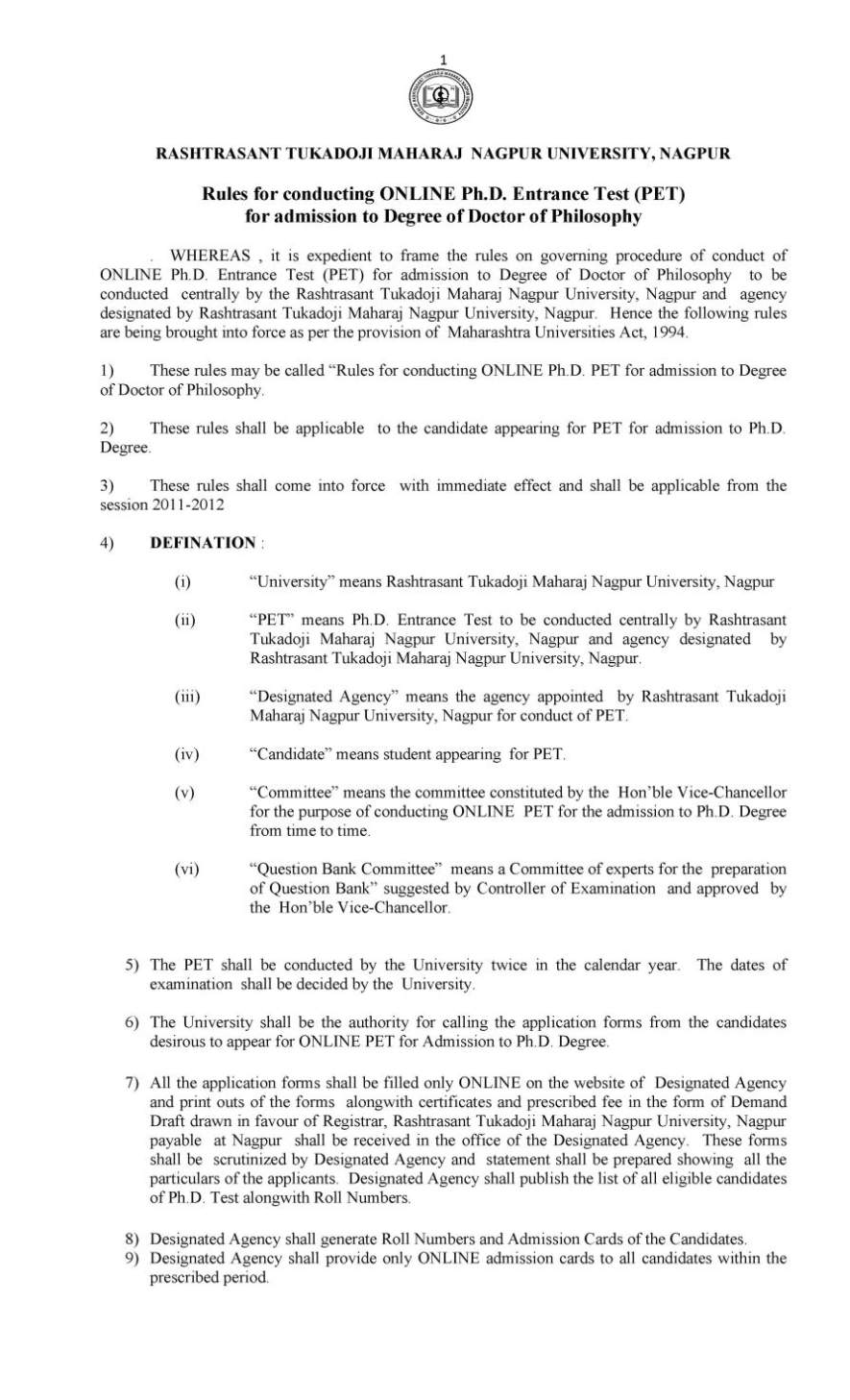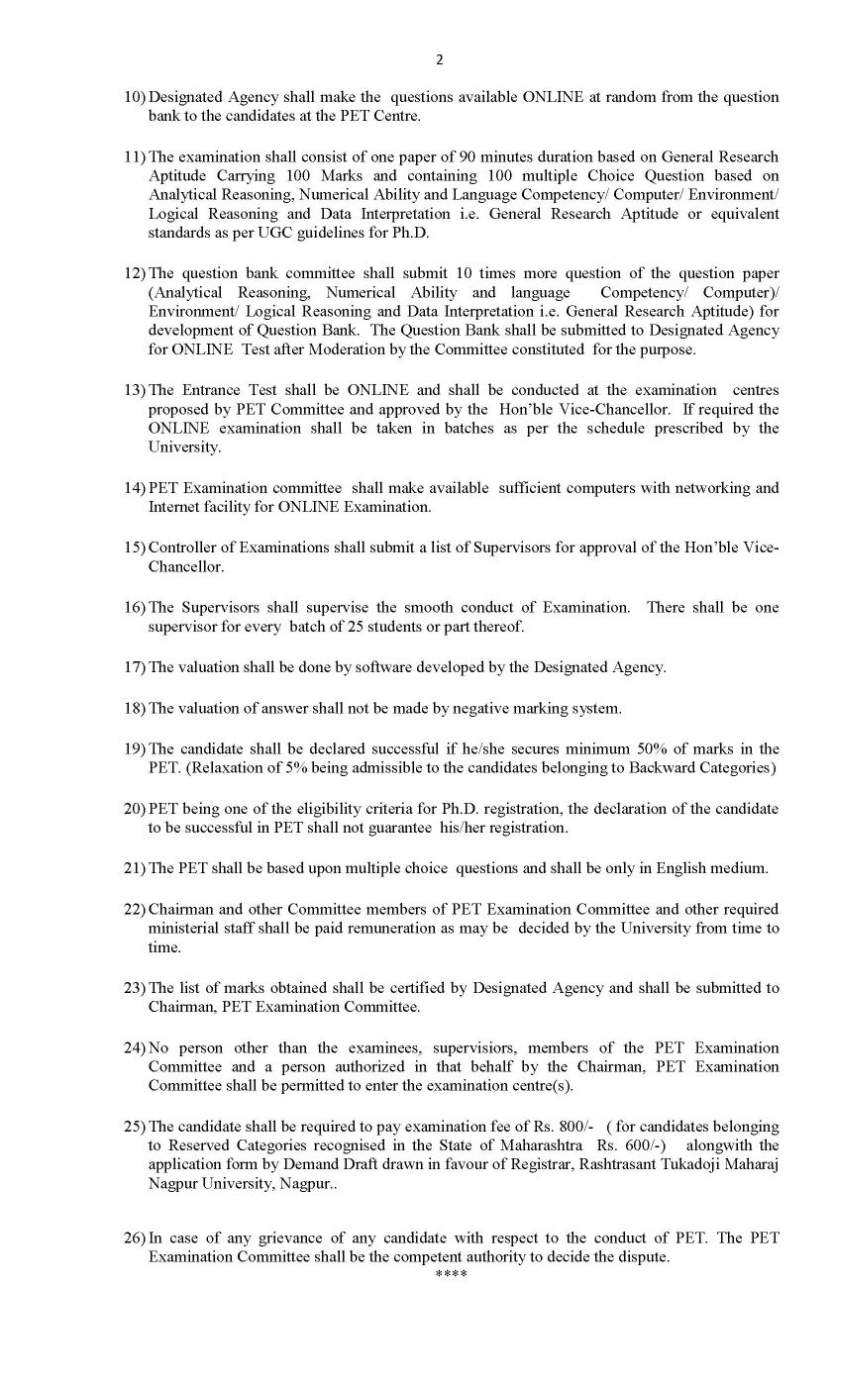| Re: Phd Entrance Exam of Nagpur University
The Sociology subject Syllabus for PET (PhD Entrance Test) – II of Rashtrasant Tukadoji Maharaj Nagpur University is as follows:
Syllabus for Pet – II Examination
Name of Subject: Sociology
Faculty of Social Science, Subject Code: 1.01
Unit–I: Structural ism and Functionalism:
A. Structuralism of A.R. Radcliffe Brown and Levi-Strauss
B. Robert K. Merton: Middle range theory, Codification of functional analysis and
reference group
C. Talcott Parsons: Theory of Social System, Theory of Social Action,
Pattern variables and Functional Dimensions of Social System
D. Functionalism of Branislaw Malinowski
Unit:–II: Conflict Theory:
A. Karl Marx: Class and Class Conflict, Dialectical Materialism,
Ideology and Social Change
B. Ralf Dahrendorf: Imperatively Coordinated Association and Class Conflict,
Dahrendorf’s Criticism of Marx
C. Lewis Coser: Functional analysis of conflict
D. C. Wright Mills: Power Elite
Unit–III: Symbolic Interactionism, Phenomenology and Ethnomethodology:
A. G.H. Mead: Self, Mind and Society
B. Herbert Blumer: Basic Premises of Symbolic Interactionism
C. Ethnomethodology of Harold Garfinkel and
Goffmann’s Presentation of Self in Everyday Life
D. Phenomenology of Alfred Schutz, Peter Berger and Lookman’s concept of Social
Construction of Reality
Unit–IV: Critical Theory:
A. Max Horkheimer, Theodore Adorno and Herbert Marcuse
B. Jeorg Lukacs, Antonio Gramsci and Louis Althusser
C. Jurgen Habermas: Communication Theory and Colonization of Life World
D. Role and importance of Critical theory
Unit–V: Recent Trends in Sociological Theory:
A. Structuration: Anthony Giddens and Margaret Archer
B. Post-Structuralism: Jacques Derrida and Michel Focault
C. Post Modernism: Jean Baudrillad and Pierre Bourdieu
D. Gender Theory: Radical, liberal, Marxist and Black Feminism
Unit–VI: Perspectives on Indian Society:
A. Textual Perspective: Louis Dumont and Radha Kamal Mukherjee B.
Structural-Functional Perspective: S.C. Dube and M.N. Srinivas C.
Marxist Perspective: D.P. Mukherjee and A.R. Desai.
D. Sabaltern perspective: B.R. Ambedkar and Davis Hardiman
Unit–VII: Theoretic al Orientation to Methodology:
A. Max Weber: Ideal type, value free and value neutral approach
B. Emile Durkheim: Social fact and positivism
C. Vilfredo Pareto: Logico-Experimental Method
D. Epistemology and social research
Unit–VIII: Quantitative and Qualitative Methods in Social Research:
A. Formulation of research questions, review and research gap and hypotheses B.
Techniques and Methods of Data Collection, precautions while developing
techniques of data collection
C. Universe and sample
D. Data Analysis, interpretation and report writing
Suggested Readings:
1. George Ritzer, 1996, Sociological Theory, The McGRAW-HILLInternational Editions.
2. Parsons Talcott, The Structure of Social Action, Vol. I & II, McGraw Hill, New York.
3. Nisbet, 1966, The Sociological Tradition, Heinmann Educational Books Ltd, London.
4. Zetlin Irving, 1981, Ideology and the Development of SociologicalTheory, Prentice Hall.
5. Dahrendorf Ralph, 1959, Class and Class Conflict in Industrial Society.
6. Bendiz Rinehard, 1960, Max Weber, An Intellectual Portrait.
7. Popper Karl, 1945, Open Society and its Enemies, Routledge, London.
8. Aron Raymond, Main Currents in Sociological Thought, Vol. I & II, Penguin.
9. Coser L.A., 1977, Masters of Sociological Thought, New York.
10. Ritzer, George. Sociological Theory, Mac-Graw-Hill, 2000.
11. Ritzer, George. Encyclopedia of Social Theory. Vol.I&II. Sage Pub. 2005.
12. Giddens and Turner (eds.). Social Theory Today, Cambridge: Polity Press, 1987.
13. Abraham, M.F. Modern Sociological Theory, New Delhi: OUP. 1990.
14. Haralambos and Holborn. Sociology: Themes and Perspective. Fifth Edition, Collins, 2000.
15. Calhoun, Craig, Rojek, Chris & Bryan Turner. The Sage Handbook of Sociology, Sage Publications,
2005.
16. Ritzer, George and Barry Smart. Handbook of Social Theory, Sage Publications, 2001.
17. Ruth A. Wallace and Alison Wolf. Contemporary Sociological Theory, 6th Edition, Eastern Economy
Edition, Prentice-Hall of India, New Delhi, 2008.
18. David Ashley and David, Michael Orenstein. Sociological Theory, Sixth Edition, Pearson Education,
2005.
19. Tim Delaney. Contemporary Social Theory, Pearson Education, 2008.
20. Jonathan, H. Turner. The Structure of Sociological Theory, Rawat Publications, Jaipur, 1987.
21. Anthony Elliott. Contemporary Social Theory, London: Routledge and Kegan Paul, 2009, Indian
Reprint, 2010.
22. Alexander, Jeffrey C, 1987, Twenty Lectures: Sociological Theory since World War II, New York,
ColumbiaUniversity Press.
23. Craib, Ian, 1992, Modern Social Theory: From Parsons to Habermas (2nd edition), London, Harvester
Press.
24. Collins Randall, 1997 (Indian edition), Sociological Theory, Jaipur and New Delhi, Rawat Publications.
25. Giddens Anthony, 1983, Central Problems in Social Theory: Action, Structure and Contradiction in
Social Analysis, London, Macmillan.
26. Kuper Adam, 1975, Anthropologists and Anthropology: The British School, 1922-72, Harmondsworth,
Middlesex, Penguin Books.
27. Kuper Adam and Jessica Kuper (ed.), The Social Science Encyclopedia, London and New York,
Routledge.
28. Ritzer George, 1992, Sociological Theory, New York, McGraw-Hill.
29. Sturrock John, (ed.), 1979, Structuralism and since: From Levi-Strauss to Derida, Oxford, OUP.
30. John Rex, Key Problems of Sociological Theory, Routledge, London.
31. Turner, Jonathan H., 1995, The Structure of Sociological Theory, Jaipur and New Delhi, Rawat
Publications.
32. Zeitlin, Irving M., 1998, Rethinking Sociology: A Critique of Contemporary Theory, Jaipur and New
Delhi, Rawat Publications.
33. Francis Abraham, Modern Sociological Theory, Delhi, OUP.
34. Skidmore William, Theoretical Thinking in Sociology, CambridgeUniversity Press.
35. DeSouza, P.R. (ed), 2000, Contemporary India-Transitions, New Delhi, Sage.
36. Dhanagare, D.N. 1993, Themes and Perspectives in Indian Sociology, Jaipur, Rawat.
37. Dube, S.C. 1973, Social Sciences in a Changing Society, LucknowUniversity Press.
38. Dube, S.C. 1967, TheIndianVillage, London, Routledge, 1955.
39. Dumont, Louis. 1970, Homo Hierarchicus: The Caste System and its Implications, New Delhi, Vikas.
40. Karve, Irwati. 1961, Hindu Society: An Interpretation, Poona, DecanCollege.
41. Momin, A.R. 1996, The Legacy of G.S. Ghurye: A Centennial Festschrift, Popular Prakashan, Bombay.
42. Mukherjee, D.P. 1958, Diversities, People’s Publishing House, Delhi.
43. Oommen, T.K. and P.N. Mukherjee, (eds.), 1986, Indian Sociology:Reflections and Introspections,
Popular Prakashan, Bombay.
44. Singh, K.S. 1992, The People of India: An Introduction, Seagull Books, Calcutta.
45. Singh, Y. 1986, Indian Sociology: Social Conditioning and Emerging Concerns, Delhi Vistaar.
46. Singh, Y. 1973, Modernization of Indian Tradition, Delhi, Thomson Press.
47. Srinivas, M.N. 1960, India’s Villages, Asia Publishing House, Bombay.
48. Tylor, Stephen: India;An Anthropological Perspective.
49. Guha, Ranjit (ed), 1982, Subaltern Studies: Writings on South Asian History and Society, Oxford.
50. Desai, A.R. 1948, Social Background of Indian Nationalism, Popular, Bombay.
51. Ambedkar, B.R. Speeches and Letters, Bombay.
52. Sinha, Surajit. 1980, Tribes and Indian Civiilization, in Manin India.
53. Bose, Nirmal Kumar, Problems of Indian Nationalism, Calcutta.
54. Singhi, N.K.1996, Theory and Ideology in Indian Sociology, Rawat, Jaipur.
Refer all concerned Articles from Man in India, Eastern Anthropologist and Social Change.
55. Wilkinson, T. S., and P. L. Bhandarkar., Methodology and Techniques of Social Research, Himalaya
Publishing House, Mumbai, (Reprint, 2004)
56. Bryman, Alan, Quality and Quantity in Social Research, UnwinHyman, London, 1988.
57. Hughes, John., The Philosophy of Social Research, Longman, London, 1987.
58. D.A.de Vaus, Surveys in Social research, George Relen and Unwin, London, 1986.
59. Bose, Pradip Kumar, Research Methodology, ICSSR, New Delhi.
60. Madge, John., The Origins of Scientific Research, Tavistock, London,1970.
61. Punch, Keith, Introduction to Social Research, Sage Publications, New Delhi, 1986.
62. Srinivas, M.N. and A.M. Shah, Field Worker and the Field, Oxford University press, New Delh, 1979.
63. Beteille A., and T.N. Madan, Encounter and Experience:Personal Accounts of Fieldwork, Vikas
Publishing House Pvt. Ltd., New Delhi, 1975.
64. Barnes, John A., Who Should Know What? Social Science, Privacy and Ethics, Harmondsworth,
Penguin, 1979.
65. Mukherjee, P.N., Methodology in Social Research: Dilemma and Perspectives, Sage Publications, New
Delhi, 2000.
66. Shipman, Martin, The limitations of Social Research,Longman, London, 1988.
67. Sjoberg, Gidden and Roger Nett., Methodology for Social Research, Rawat publications, Jaipur.
68. Smeler, Neil J., Comparative Methods in Social Science.
69. Garett, Henry. E., Statistics in Psychology and Education, David Mckay, Indian Publication,
Bombay, Tenth Reprint, 1981.
70. Moser, C.A., Survey Methods in Social Investigation, Heinemann, 1971.
71. Somekh, B and Lewin, C., (eds.), Research Methods in Social Sciences, Vistaar Publication, New
Delhi, 2005.
72. Giri, Ananta K., (ed.), Creative Social Research: RethinkingTheories and Methods, Vistaar
Publication, New Delhi, 2004.
73. Whyte, W.F., Street Corner Society.
74. Daniel Bell, Doing Sociological Research.
75. Bhandarkar, P.L., Samajik Sanshodhan Padhati (Marathi).
|

